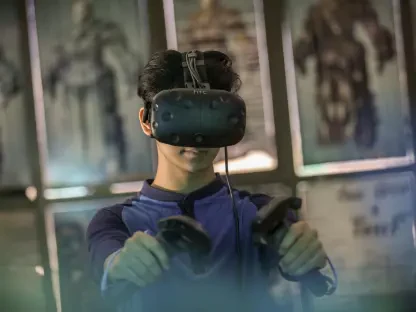In the rugged landscapes and underserved neighborhoods of Chile, a remarkable movement is taking shape as students from Pontificia Universidad Católica de Chile (UC Chile) dedicate themselves to transformative volunteer work, stepping into the heart of social inequalities. These young changemakers are not merely pursuing academic excellence; they are offering their time, skills, and compassion to communities in dire need. From isolated rural villages to struggling urban areas, their efforts, especially during intense winter service programs, are a beacon of hope for many. This commitment goes beyond traditional charity, weaving a powerful narrative of personal growth for the students and tangible progress for the people they serve. Every year, hundreds of these dedicated individuals collaborate across various student-led organizations to tackle pressing issues like inadequate housing, limited healthcare access, and spiritual disconnection. Their work is a testament to the belief that education extends far beyond the classroom, shaping empathetic leaders who are equipped to address societal challenges. The dual impact of these initiatives is striking—while marginalized communities gain essential support and renewed dignity, the students themselves uncover profound lessons about responsibility and humanity. This dynamic interplay of giving and learning forms the core of UC Chile’s mission, highlighting how volunteerism can be a catalyst for widespread change in a nation marked by significant disparities.
Unleashing Potential Through Hands-On Learning
At UC Chile, volunteering serves as an extraordinary platform for education that transcends the confines of lecture halls and textbooks. Students immerse themselves in real-world challenges, applying their academic expertise to address critical needs in vulnerable communities. Whether it’s engineering students designing and constructing emergency shelters or medical students providing essential health screenings, these young volunteers translate theory into action. Beyond technical skills, they cultivate vital qualities such as empathy, adaptability, and perseverance, which are often honed in the face of complex, on-the-ground problems. This experiential learning environment allows them to see the direct impact of their contributions, whether it’s a family moving into a newly built home or a patient receiving life-changing care. Such moments instill a sense of purpose, reinforcing the idea that their education is not just about personal achievement but about making a difference in the lives of others.
Equally significant is how these experiences reshape students’ perspectives on their own potential and societal roles. Confronting the stark realities of poverty and inequality, they gain insights that no classroom simulation can replicate. Working side by side with community members, they witness firsthand the resilience and struggles of those often overlooked by mainstream systems. This exposure sparks a deeper understanding of systemic issues, motivating many to pursue careers or advocacy work aimed at long-term solutions. The lessons learned in these raw, unfiltered settings often become defining moments, pushing students to rethink success not as individual gain, but as collective progress. Through this transformative process, volunteering becomes a powerful teacher, equipping them with both the skills and the heart to lead with compassion.
Championing Social Justice and Civic Duty
A core pillar of UC Chile’s volunteer initiatives is the emphasis on social responsibility, reflecting a deep-seated belief that building a more equitable Chile is a shared endeavor. Students are encouraged to step beyond passive observation and take active roles in addressing societal challenges, a stance inspired by influential voices like President Juan Carlos de la Llera, who draws on global calls to reject indifference. This proactive mindset positions them as vital contributors to national progress, challenging the notion that solutions should solely come from policymakers or established institutions. By engaging directly with marginalized populations, they embody a commitment to justice, working to bridge gaps in access to basic needs like shelter and healthcare. Their actions send a clear message: young people have the power to influence change, no matter the scale of the obstacles.
This dedication to civic engagement is deeply embedded in the university’s ethos, which views service as an integral part of a student’s journey. The programs are not seen as mere extracurriculars but as essential experiences that shape character and worldview. Students tackle issues that reflect Chile’s broader struggles with inequality, from rural isolation to urban deprivation, demonstrating that even small interventions can ripple outward to inspire hope. Their efforts often counter cultural tendencies toward apathy, showcasing a generation willing to roll up their sleeves and confront discomfort for the greater good. Supported by a university framework that prioritizes social impact, these volunteers emerge as torchbearers of a movement that seeks to redefine what it means to be a citizen in a divided society.
Creating Connections Through Shared Growth
Volunteer programs at UC Chile are far more than acts of service; they are dynamic exchanges that enrich both the givers and receivers. As students deliver practical support—be it constructing homes for displaced families or offering dental care to those who’ve never seen a doctor—they also absorb invaluable lessons from the communities they assist. Engaging with individuals facing daily hardships, they develop a nuanced appreciation for resilience and diversity in lived experiences. This two-way learning process fosters genuine connections, breaking down barriers of privilege and misunderstanding. Students often find their assumptions challenged, gaining a broader perspective on life’s complexities while realizing the universal need for dignity and support.
The benefits to communities are equally profound, extending beyond material aid to emotional and cultural solidarity. A newly erected shelter provides not just physical safety but a sense of stability for a struggling family, while health initiatives address critical gaps that can alter life trajectories. Additionally, projects that emphasize spiritual or communal bonding, such as music and storytelling sessions, nurture a sense of belonging that is often as vital as tangible resources. These interactions create enduring ties, with many students returning from their service profoundly moved by the stories they’ve encountered. The mutual growth that emerges from these shared moments underscores the power of human connection, reinforcing the idea that true change happens when empathy and action intersect in meaningful ways.
Embedding Service in Holistic Education
UC Chile stands out for its commitment to weaving volunteerism into the very fabric of its educational mission, recognizing service as a cornerstone of developing well-rounded individuals. Through structured support from entities like the Office of Student Affairs and Pastoral UC, these initiatives are seamlessly integrated with academic goals, ensuring that students see their service as a natural extension of their learning. Leaders within the university, such as Carola Méndez, highlight how these experiences leave lasting impressions, molding students into professionals who prioritize societal good alongside personal success. This approach redefines education as not just the pursuit of knowledge, but the application of that knowledge to uplift others, creating a legacy of impact that endures long after graduation.
The practical and personal growth derived from these programs is a testament to their comprehensive design. Students refine discipline-specific skills—think architecture majors honing construction techniques or health science students mastering patient care—while simultaneously building universal traits like leadership and compassion. Facing real-world constraints, they learn to innovate and collaborate, often under pressure, preparing them for future challenges in any field. More crucially, the emotional maturity gained from witnessing and alleviating suffering equips them to approach their careers with a human-centered focus. UC Chile’s dedication to this dual development ensures that its graduates are not only technically adept but also deeply committed to ethical responsibility, ready to champion fairness in an often unequal world.
Reflecting on a Legacy of Impact
Looking back, the volunteer efforts of UC Chile students paint a vivid picture of transformation across countless Chilean communities. Their tireless work in constructing homes, delivering healthcare, and fostering spiritual connections has brought measurable relief to those grappling with hardship. Each project, whether a winter service mission or a year-round initiative, stands as evidence of what determined youth can achieve when guided by compassion and purpose. The stories of changed lives—both of the served and the servers—echo through the university’s halls, leaving an indelible mark on its history.
Moving forward, the challenge lies in amplifying these efforts to reach even more corners of Chile’s diverse landscape. Expanding partnerships with local organizations and leveraging technology to streamline outreach could magnify the scope of impact. Encouraging alumni to continue this spirit of service in their professional lives might also sustain the momentum, creating a network of advocates for equity. As UC Chile continues to champion volunteering as a vital educational tool, the potential for broader societal shifts remains immense, promising a future where every student’s contribution helps weave a stronger, more inclusive national fabric.









